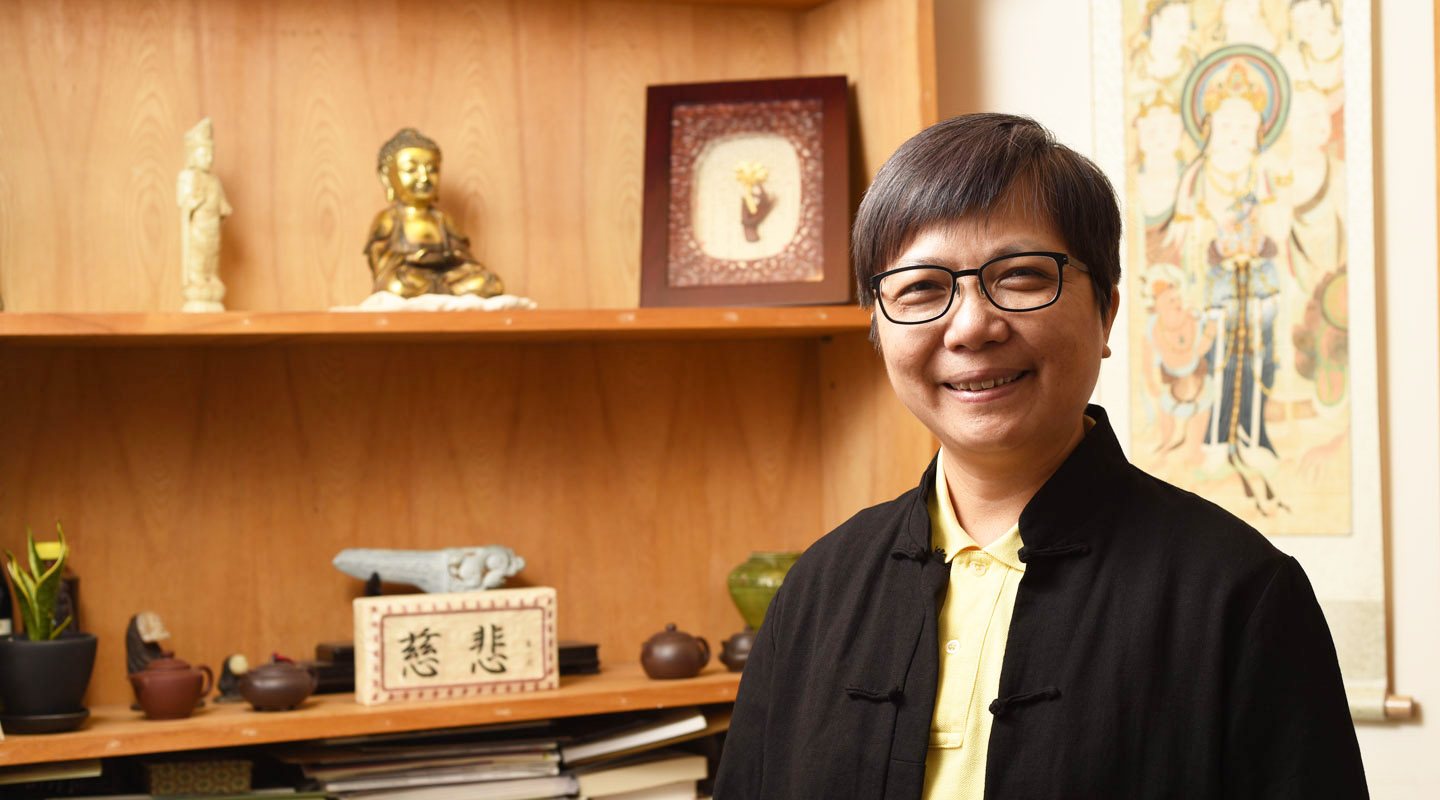Dear readers, With the launch of e-newsletter CUHK in Focus, CUHKUPDates has retired and this site will no longer be updated. To stay abreast of the University’s latest news, please go to https://focus.cuhk.edu.hk. Thank you.
If Music be the Key to the Heart
Agnes Chan starts a social enterprise for children with autism

Disappearing into a wide block of traditional Chinese tenements at the end of Shanghai Street, Prof. Agnes Chan, a CUHK clinical psychologist, ascends the steep and narrow steps that lead up to her newly opened Music Neuropsychology Training Centre. Eight children file in in the company of their parents, slip off their shoes and frolic around in the 600 sq. ft. area. Professor Chan waves hello to them enthusiastically, but none of the kids ever looks her in the eye to acknowledge or reciprocate the greeting. That is not something to be taken personally, because reading facial expressions and making eye contact, two of the social skills that most of us pick up naturally, can be very challenging for people on the autism spectrum.
Music in the Mind
The classroom is equipped with a digital piano, a violin and assorted small instruments such as triangles, maracas and Chinese drums, but this is no ordinary music playgroup. ‘Music acts as a conveyor belt that carries what we truly want to impart to the autistic children—verbal expression, emotional control, concentration and so on. It’s not easy to have an autistic child’s attention for 90 minutes, so we use music as a means to engage the interest of the little learners,’ says Professor Chan.
A year ago, having received a funding of HK$400,000 from the Sustainable Knowledge Transfer Project Fund (S-KPF) administered by the Office of Research and Knowledge Transfer Services (ORKTS), Professor Chan started up the Pro-talent Association, a social enterprise that brings her decades of research on the neuropsychology of music out of campus to the community.
As early as 1998, in a co-authored article published in Nature, Professor Chan revealed the link between music training and improved brain functions: ‘Music training has advantages over other means (to improve verbal memory). First, it may be easier to engage children in playing musical instruments, which is an enjoyable activity, than in mnemonic strategies. Second, musical training requires little verbal skill, so it may be more suitable as a memory-training technique for patients with language impairment.’
Class begins. With the aid of delightful tunes played by the instructor, each child is encouraged to introduce him/herself to the rest to practise his/her social skills. The following musical training is divided into four sessions: having the kids tap tempo against the floor with drumsticks, leap or squat on cues of high or low notes, sing nonsensical nursery rhymes to exercise vocal muscles, and discern emotions like joy, anger and fear through appreciating various symphonies.
Many of us have heard stories about autistic children who turn out to be music prodigies or math geniuses, which according to Professor Chan is a misconception. ‘It is just as wrong to write off autistic people as good-for-nothing as it is to idolize them as possessing perfect pitch or photographic memory, if not both. Among the general population there is always a certain percentage born with exceptional talents. The same odds apply to the autistic group as well.’

Turning Talent into Triumph
Besides using music to enhance cognitive functions in autistic children, Pro-talent strives to transform their strengths and special interests into occupational skills needed for life as adults, in the hope that individuals with special needs can also lead independent and fulfilling lives when they grow up.
‘Many children with autism have speech disorders or don’t talk at all. It is difficult for them to walk the conventional education and career paths, let alone becoming professionals like university-goers do. As the name suggests, Pro-talent supports the development of gifts like music, painting, ceramics, cooking and gardening. By becoming musicians, painters, ceramists, cooks and gardeners, autistic youths can feel proud of what they do. After all, what they need most is not a job opportunity, but living a life of dignity.’
Bridging Gown and Town
Mr. Perkins Ho of ORKTS is responsible for administering entrepreneurship and social innovation projects. He and his team have walked Pro-talent from its inception to fruition. ‘What I appreciate most about Professor Chan is that she sets specific goals and has a clear vision of them. With incredible persistence and no shortage of social capital, she is able to meet every challenge with grace and poise.’
On top of the HK$400,000 initial fund, Pro-talent can apply for the S-KPF again for the second year in business, with a HK$200,000 cap, to move ahead with its plan to form a chamber orchestra comprising individuals with autism. Bankroll aside, ORKTS also found Professor Chan a business consultant—Mr. Antony Pang who was former CEO of Dialogue in the Dark—to advise on the managing of a social enterprise.
Mr. Ho said, ‘S-KPF targets professors who had benefited from the Knowledge Transfer Project Fund and encourages them to extend their experience and social capital from one-off projects to sustainable social enterprises. In doing so, they would reach out to a wider and more varied group of people in need.
‘What makes S-KPF unique is that it opens the way for academics to become social entrepreneurs. It promotes creative solutions to social problems as well as the art of running a sustainable business. Such crossover of social enterprise and the academia will surely tap into many possibilities.’
This article was originally published in No. 485, Newsletter in Oct 2016.